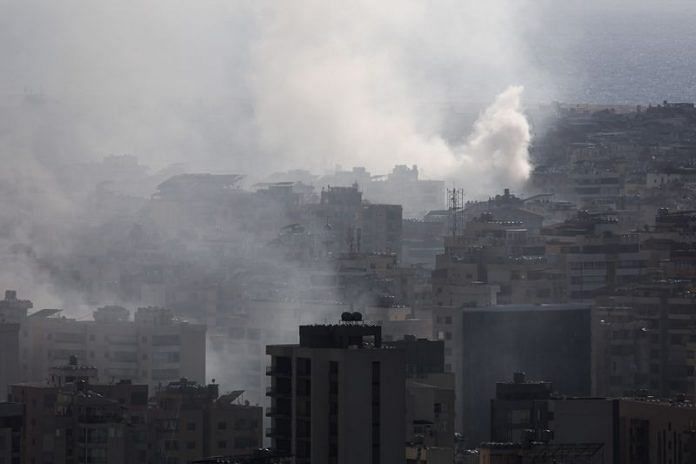By Ari Rabinovitch and Maya Gebeily
JERUSALEM/BEIRUT (Reuters) -Hezbollah said its fighters were engaging Israeli forces inside Lebanon on Wednesday, reporting ground clashes for the first time since Israel began pushing into its northern neighbour in a campaign to hammer the Iran-backed armed group.
The Israeli military said regular infantry and armoured units were joining its ground operations in Lebanon, a day after Israel was attacked by Iran in a strike that raised fears the oil-producing Middle East could be engulfed in a wider conflict.
An Israeli team commander was killed in Lebanon, the Israeli military said.
Iran said on Wednesday its missile attack – its biggest assault on Israel – was over barring further provocation, but Israel and the United States promised to hit back hard.
A 38-year-old Gazan, the only known fatality in Iran’s attack against Israel, was buried on Wednesday.
Sameh Khadr Hassan Al-Asali had been staying in a Palestinian security forces compound in the occupied West Bank when he was killed by falling missile debris during Tuesday’s attack, which Israel said was largely thwarted by its air defence systems.
Hezbollah said it had clashed with Israeli troops in the border town of Maroun el-Ras and pushed back forces near other border towns. The group said it had also fired rockets at military posts inside Israel.
The group’s media chief Mohammad Afif said those battles were only “the first round” and that the group had enough fighters, weapons and ammunition to push back Israel.
There was no immediate comment from Israel.
Israel’s addition of infantry and armoured troops from the 36th Division, including the Golani Brigade, the 188th Armoured Brigade and 6th Infantry Brigade suggests that the operation may move beyond limited commando raids.
The military has said its incursion is largely aimed at destroying tunnels and other infrastructure on the border and there were no plans for a wider operation targeting the capital Beirut or major cities in southern Lebanon.
Nevertheless, it issued new evacuation orders for around two dozen towns along the southern border, instructing inhabitants to head north of the Awali River, which flows east to west some 60 km (37 miles) north of the Israeli border.
BORDER CLASHES
Despite global calls for a ceasefire, fighting between Israel and the Lebanon-based Hezbollah has continued.
Israel renewed its bombardment early on Wednesday of Beirut’s southern suburbs, a stronghold of the Iran-backed group, with more than a dozen airstrikes against what it said were targets belonging to Hezbollah.
Nearly 1,900 people have been killed and more than 9,000 wounded in Lebanon in almost a year of cross-border fighting, with most of the deaths occurring in the past two weeks, according to Lebanese government statistics. More than a million people have been forced to flee their homes.
Malika Joumaa, from Sudan, was forced to take shelter in Saint Joseph’s church in Beirut after being forced from her house near Sidon with her husband and two children.
“It’s good that the church offered its help. We were going to stay in the streets, where would we have gone? We were (sheltering) under the bridge, it is not safe, if we go back home, it is not safe, they are striking everywhere.”
Iran described Tuesday’s assault as a response to Israeli killings of militant leaders, including Hezbollah chief Hassan Nasrallah, and attacks in Lebanon against the group and in Gaza.
Like a similar attack in April, the latest strikes caused minimal damage.
The general staff of Iran’s armed forces said any Israeli response would be met with “vast destruction”.
U.S. news website Axios on Wednesday cited Israeli officials as saying Israel will launch a “significant retaliation” to Iran’s attack within days that could target oil production facilities inside Iran and other strategic sites.
On social media, Iranians were apprehensive about Israeli retaliation and said past wars, such as the eight-year conflict with Iraq in the 1980s that killed about one million people, would only bring more suffering.
FEARS OF FURTHER VIOLENCE
“The destruction of generations, young people being cannon fodder, the enrichment of generals and elites, and the empowerment of extremists? Leaders will not pay for dragging Iran into war,” said Nima Mokhtarian, who works at an NGO.
Some Iranians believe their government had no choice but to send scores of missiles to Israel, but fear what will come next as Israel’s military, the most powerful and advanced in the region, prepares to retaliate.
“If there is a war, I’m just worried for my children,” said an Iranian mother walking to work past a towering billboard in Valiasr Square featuring a portrait of Nasrallah, who was Iran’s strongest regional proxy.
“If we hadn’t responded to Israel, they might have continued with their acts of destruction. I just fear for my children.”
Iran’s missile strikes and Israel’s operations in Lebanon have caused alarm around the world, as Tehran’s Middle East proxies — Hezbollah, Yemen’s Houthis and armed groups in Iraq — show no let up in attacks in support of Hamas.
“It’s time for the entire axis to enter the battle, from Iran to Iraq to Yemen to Syria to Lebanon to Gaza, it’s time. Because it’s clear that nothing can stop Israel, not international laws,” said Lebanese resident Amal.
(Reporting by James Mackenzie and Steven Scheer in Jerusalem; Maya Gebeily and Timour Azhari in Beirut; Parisa Hafezi in Istanbul; Phil Stewart, Jeff Mason and Idrees Ali in Washington; Michelle Nichols in New York; Adam Makary, Jaidaa Taha and Enas Alashray in Cairo; and Tala Ramadan, Jana Choukeir and Jack Kim in Seoul and Matthias Williams in Berlin, Elwely Elwelly and Clauda Tanios in Dubai and Angelo Amante and Giuseppe Fonte in Rome and Parisa Hafezi in Dubai; Writing by Michael Georgy; Editing by Michael Perry, Clarence Fernandez and Sharon Singleton, William Maclean)
Disclaimer: This report is auto generated from the Reuters news service. ThePrint holds no responsibilty for its content.



